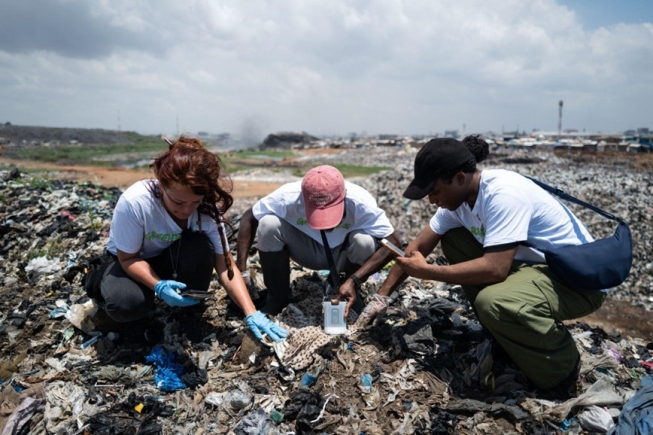![]()

Fast fashion, slow poison: Ghanaian government must end the importation of textile dead waste
Every week over 15 million used garments known as “Oburoni Wawu” which literally translated as “dead white man’s clothes” arrive in the port of Tema, Ghana’s largest port. About 70% of these clothes are sent to Kantamanto, Ghana’s largest second-hand clothing market and one of the biggest in Africa.
With a population of 31 million - these quantities are well beyond any demand for second hand clothes. Out of this, nearly 50% of them being waste will end up in open dumpsites where they are burnt releasing hazardous chemicals. The textile industry causes a massive amount of pollution, contributing up to 10 percent of global greenhouse-gas (GHG) emissions.
This crisis is not only affecting communities in Ghana. The ever-increasing overproduction of low quality, synthetic clothing is leading to a massive waste problem. Export of unwanted clothing from the Global North to Africa is overwhelming local waste management systems.
In Kenya and Tanzania where imported used clothes called “Mitumba” relevant to many people and the economy are, nearly half of the clothes imported are not even usable or sellable and quickly end up on dumpsites, in rivers and being burnt on open fires. The Global North has found a backdoor to get rid of its textile waste and is forcing countries from the Global South to deal with the consequences of fast fashion, even though they have no infrastructure to do so.
The ‘colonial mindset’ in the Global North which considers that exporting unusable clothes and other non-recyclable waste from the linear business models that dominate the global economy to other countries is highly unacceptable and the highest form of waste colonialism that countries in the Global South have had to contend with for decades.
Late last year, our team travelled to Accra Ghana to document the reality of clothes waste dumping on the ground, the contamination with hazardous chemicals in this waste stream and the impacts of non-recyclable fast fashion from cradle to grave, and contrast this with the creative solutions of ordinary people. The report Fast Fashion, Slow Poison; The Toxic Textile Crisis in Ghana highlights the danger and negative impacts of fast fashion in communities in the West African country.
The research results were astonishing; the majority of clothing waste that ends up in dumpsites is made from blends of fibres, with almost all (89%) containing fossil fuel based synthetic fibres like polyester which will break up into micro plastic leaching into the environment.
The air samples from public washhouses in Accra’s Old Fadama settlement showed dangerously high levels of toxic substances, including carcinogens like benzene and polycyclic aromatic hydrocarbons (PAHs). These hazardous chemicals and microplastics will pollute the soil, the water, the air, and contaminate the food web and pose immense public health challenges.
However, all is not lost, solutions for Africans by Africans do exist and can be amplified to alleviate the fashion waste crisis in Ghana. The Ghanaian government can invest and build a sustainable local textile industry by embracing and supporting local solutions and highlight makers of clothes and fashion in Africa, using alternative business models such as cooperatives, and people creating new solutions by reusing and upcycling textiles, as well as making long lasting and beautiful clothes for local people from their own traditions.
The Ghanaian government needs to end the importation of dead waste; only import used clothes that can actually be re-used as wearable clothing. They should no longer accept waste dumping from the Global North through action, legislation, industries and alternatives. They need to adopt stringent policies that prevent waste dumping, uphold communities’ right to a safe, clean and healthy environment and promote alternative and sustainable industries.
The policy makers should push the Global North for an International legislation to be established through a global treaty, similar to the Paris Convention on climate change and the recently agreed UNEA plastics treaty, that would implement the aims of the EU textiles strategy. But unfortunately, legislation alone cannot solve the problem of ultra fast fashion. Regulation is the starting point for change, but as long as there is consumer demand, companies will find ways to circumvent or water down regulation. The other way to tackle the fast fashion problem is to educate consumers and show them that there are other ways to follow fashion.
Policy makers must call for the Extended Producer Responsibility (EPR) schemes that will be dedicated to waste prevention measures and reuse and refill. This should also incorporate the ‘Polluter Pays’ principle – i.e. the producer is made financially responsible for the cost of cleaning up the environmental and health damage caused throughout the supply chain, regardless of the geographical extent of the damage.
Finally, there needs to be a shift away from neocolonial attitudes of Global North countries towards those in the Global South, which impose trading practices which are mainly beneficial for the Global North. This effectively turns Global South countries into dumping grounds for fashion industry waste, while doing little or nothing to support or develop countries in the Global South.
The attitude of people in Africa to clothing; one of invention and re-creation of clothing, a mindset which is being undermined by the expansion of textiles exports from the global corporations resulting from the linear business model. This positive attitude is much needed to bring an end to fast fashion by countering the development of the overconsumption mindset locally in the Global South
By Hellen Kahaso Dena
Project Lead- Pan- African Plastic Project
Greenpeace Africa.
